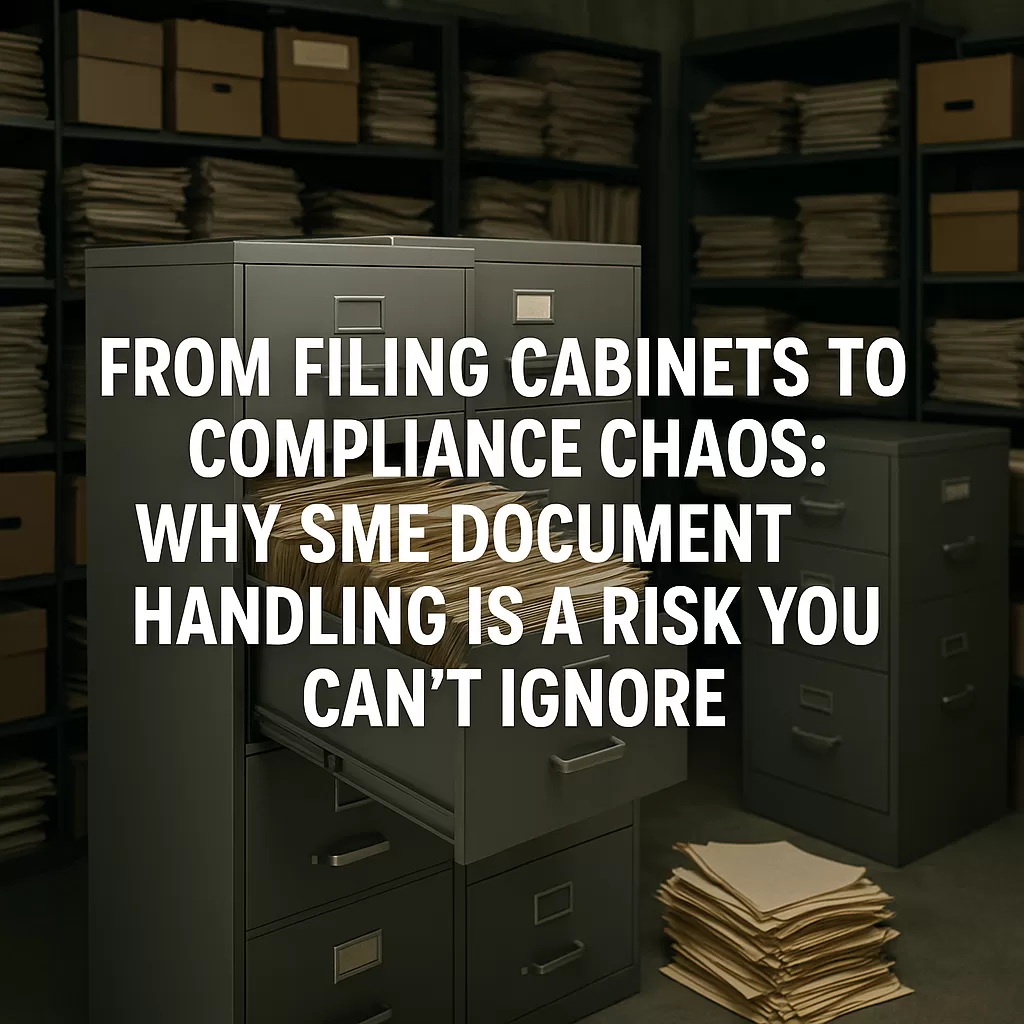
For many small and medium-sized enterprises (SMEs), document management is something that gets pushed down the to-do list – until something goes wrong. A missing contract. A data breach. A compliance audit request with no clear audit trail. Suddenly, what felt like a minor admin issue becomes a legal, financial, or reputational headache.
The truth is, poor document handling is one of the most overlooked risks in growing businesses. And with increased regulatory scrutiny, data protection rules like GDPR, and more customers expecting transparency and professionalism, it’s no longer something SMEs can afford to ignore.
So how did we get here – and more importantly, how do you protect your business?
The Hidden Danger in Filing Cabinets and Shared Drives
In many SMEs, document storage evolves organically. A mixture of:
- Paper files in cabinets and desk drawers
- PDFs saved to desktops or email threads
- Shared folders on a company server (or worse, someone’s personal Google Drive)
It seems to work — until it doesn’t.
Here’s what typically goes wrong:
- 🔍 Audit trails vanish — Who approved the document? When was it updated? Where’s the signed version?
- 🔐 Data breaches happen — Sensitive documents are emailed back and forth or left on unsecured drives.
- ⌛ Time is wasted — Employees spend hours tracking down files or recreating missing ones from scratch.
- ⚖️ You risk non-compliance — GDPR requires strict access controls, retention policies, and data visibility. Are you confident you can demonstrate that?
The bigger issue? These problems don’t scale. As your team grows, clients increase, and compliance gets tighter, your ad-hoc system becomes a liability.
What Compliance Really Means for SMEs
Compliance isn’t just for big corporations with legal departments and ISO certifications. In fact, many regulations are designed with SMEs in mind – but that doesn’t make them optional.
Here are three key areas where SMEs face growing pressure:
1. Data Protection (GDPR & beyond)
GDPR mandates that all businesses (even micro ones) manage personal data responsibly — including how it’s stored, who can access it, and when it’s deleted.
- Can you trace every document containing customer or employee data?
- Can you restrict access by role?
- Can you delete records on request?
2. Industry-Specific Standards
Depending on your sector, you may need to meet ISO standards, FCA rules, or other certifications that demand robust document controls.
- Can you show how documents were approved and by whom?
- Can you prove version control and prevent unauthorised changes?
3. Legal and Contractual Proof
Whether it’s employment contracts, health & safety policies, or supplier agreements, you need to produce the right version at the right time – especially if challenged.
- Could you find the signed version of a contract from 18 months ago?
- Can you show it hasn’t been tampered with?
Digital Document Management: The SME Advantage
Here’s the good news: you don’t need a legal team or massive IT department to fix this. Modern document management systems are now affordable, scalable, and designed for SMEs.
With a proper system in place, you can:
- 🗂️ Digitise and centralise all documents with searchable indexing
- 🛡️ Set access permissions based on user roles to comply with GDPR
- 🔁 Track document versions and build automatic audit trails
- 📅 Set retention policies to delete or archive documents automatically
- 🔎 Quickly retrieve any document — no more hunting through folders or drawers
Even better, cloud-based systems are secure, backed up, and accessible anywhere – ideal for hybrid or remote teams.
A Real-World Scenario
Let’s say a former employee submits a data subject access request under GDPR. They want every document containing their personal data within 30 days.
- If your documents are scattered across email, paper folders, and someone’s desktop, can you deliver?
- If you miss the deadline, you’re potentially looking at fines — and reputational damage.
With a document management system like Therefore (which we implement at DocR), it’s a few clicks.
It’s not just about compliance – it’s about confidence.
Avoid Chaos Before It Costs You
Compliance is no longer optional, and neither is control over your documents. Whether you’re a five-person business or scaling to 50, the systems you put in place now will either protect you — or expose you.
And the best part? Fixing it is easier and more cost-effective than most SMEs expect.
✅ Next Step: Book a Free Compliance Readiness Consultation
At DocR, we specialise in helping SMEs move from messy document systems to smart, compliant, and scalable solutions — without disruption.
🕒 In just 30 minutes, we’ll:
No hard sell – just practical advice.
Sources Include: ICO , EU GDPR, British Standards Institution (BSI), AIIM,




